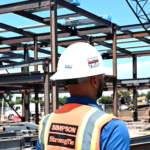In January, our engineer Shane Vilasineekul wrote about his top ten mobile apps. Today we’re talking social media and how it can help you be better at your job. Now I know that the common notion of social media is that it is more of a place to goof off from work, but stay with me here. Think of social media as a place where people can meet. There is a big difference between bars versus a conference for professionals. While they are both places where people can meet in one spot, they perform different functions. Social media is the same way. It can be used for non-professional networking, but it can also be a helpful place where structural engineers can learn about new products, industry news and trends.
Here are ways that structural engineers can use social media:
Use Twitter for Industry Events and Trends: Twitter’s strongest point is its brevity. With a 140-character limit, tweets can really get to the point. Another reason that Twitter is useful is that it is often the social media platform where you see things unfold in real time. For example, you can search industry specific events and see tweets in live time and learn about the demonstrations and seminars your colleagues think are useful, the ones to skip, etc.
LinkedIn Is An Industry News Resource: LinkedIn is not just a place to show off your resume any more. LinkedIn is becoming a hub for industry news. Do you want to know what is going on with other structural engineers? You can join industry specific groups to share tips and ideas. It’s also good practice to follow companies and clients that you work with so you know when they launch a new product, promote a new project or even share their own social media content.
Subscribe to Blogs: Following structural engineering blogs like this one ensures that you never miss a beat about what other industry folks are saying. Subscribing to a blog post means that you can read all the content an industry blog has to offer all from the comfort of your inbox. Blogs also can cover day-of/breaking news that you can’t get from trade publications.
Facebook For Recommendations: While you may look at Facebook as a more family and friends zone, there is something to be said for interacting with fellow structural engineers on this platform. If you are friends with former classmates, you will find a bevy of articles that are helpful for you from an industry standpoint. You can also ask industry specific questions to your friends or ask for recommendations from people you know and trust. Following company pages opens up opportunities to give ideas for new products, learn new product uses, or even find out about new promotions and offers.
YouTube For Educational Videos: An educational video can be a lot more effective and useful than reading a paper. Seeing how a company does product testing may even take the guesswork from your own job. At Simpson Strong-Tie, we make videos for our YouTube channel so you can see our products in action whether it’s a test or even a DIY project.
I hope this blog post takes the guesswork out of social media for you. While these are some starter suggestions, the sky is the limit. What do you use social media for? Do you see professional benefits? Let us know in the comments section.






I think social media is a wonderful resource for industry news and trends. In the past year, we’ve really been interested in watching and participating in Twitter discussions. Like you mentioned, Twitter allows you to watch things unfold in real time, this means immediate answers from leading industry professionals and links to other great resources!
These are all really valuable to keep in mind for structural engineers. What are some things to keep in mind when getting your name out there to the right people? Social media is such a huge aspect of getting your name out there these days. I really appreciate all of the advice and tips on how these different sites can be used.
Celine | http://www.telarco.com/en
I like the advice of following structural engineer blogs. Being up to date and informed about new practices is important. Social media is important with any field of work. Hopefully, keeping up with the trends will help keep me in the loop.
http://www.jjkgroup.com/services.html